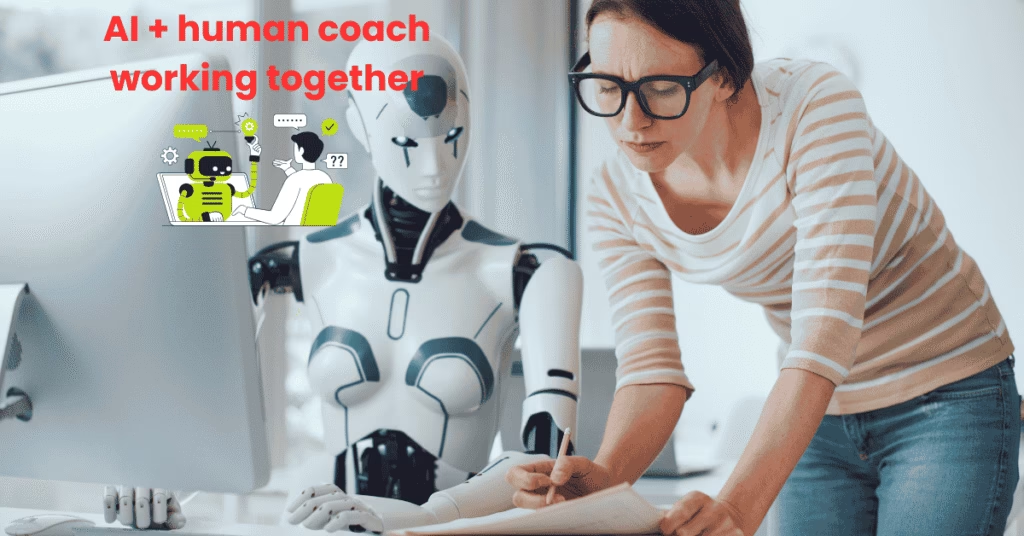Table of Contents
Introduction: Why Ethics Matter in AI Coaching
Artificial Intelligence (AI) is quickly revolutionizing the coaching business—life coaching, executive coaching, or personal growth. AI-driven platforms offer tailored guidance, evidence-based insights, and scalable solutions. But with such possibilities come, like AI Coaching ethics Guidelines, considerations.
What are AI Coaching Ethics Guidelines are ethical principles that regulate AI application in coaching? This is an important issue, since coaching AI handles sensitive information, human feelings, and individual development. The lack of established ethical principles may expose clients to risks like bias, data misuses, and accountability deficits, which can hurt clients and the coaching profession as a whole.
This blog discusses ,AI Coaching ethical Guidelines, that guide AI in coaching by referencing standards from the International Coaching Federation (ICF), UNESCO, IEEE, and the European Commission.
What are, AI Guidelines Use in Coaching?
AI application in coaching is framed by the principles of fairness, transparency, privacy, accountability, and human supervision. They are designed to maximize how AI will enhance coaching instead of replacing the human connection at its center.
Core AI Guidelines in AI Coaching
- Transparency – Clients must be able to see how AI tools make recommendations.
- Privacy & Confidentiality – Sensitive coaching information must be safeguarded under legislation like GDPR.
- Bias Prevention – AI programs should not reinforce gender, cultural, or racial stereotypes.
- Accountability – Decisions are still the responsibility of coaches, not the AI system.
- Human Oversight – AI ought to assist, rather than substitute, the coach-client relationship.

International Coaching Federation (ICF) AI Ethics Coaching Guidelines
The ICF Code of Ethics (2024 revision) stipulates that AI tools must be aligned with coaching values of trust, confidentiality, and professional responsibility.
- AI should not replace or debase the coach-client relationship.
- Disclosure is required when AI is being utilized in sessions.
- AI should be applied to facilitate insights, not make independent decisions about clients.
👉 Related Post: “AI in Personal Coach”]
UNESCO Guidelines on Ethical AI
UNESCO in 2023 approved a worldwide framework for AI ethics. These guidelines are extremely applicable to coaching:
- Human rights-based approach – AI must uphold dignity, privacy, and freedom.
- Inclusivity – AI software must be designed for diverse social and cultural contexts.
- Transparency & Explainability – Clients are entitled to know how AI impacts decisions.
🔗 UNESCO AI Ethics Recommendation
IEEE and European Commission Ethics for AI Coaching
IEEE’s Ethically Aligned Design
IEEE Ethically Aligned Design approach focuses on:
- Ensuring human well-being.
- Establishing trust through transparency.
- Transparent accountability processes for AI systems.
EU Guidelines for Trustworthy AI
Seven requirements are given by the European Commission (2023) for trustworthy AI:
- Human agency and oversight
- Technical robustness and safety
- Privacy and data governance
- Transparency
- Diversity and fairness
- Societal well-being
- Accountability

Ethical Challenges of AI in Coaching
Data Privacy and Confidentiality
Coaching contains deeply personal information. In the absence of strict data protection, AI systems can be vulnerable to data breaches or third-party misuse.
Best Practice: Always utilize encrypted platforms and abide by privacy legislation.

Fairness in AI Models
If biased data is used to train AI, it can provide misleading or unfair suggestions. For instance, career coaching AI could under-represent women as leaders.
Best Practice: Conduct regular audits on AI models for fairness.
Over-Reliance on AI
Human empathy can never be fully replicated by AI. Coaches need to ensure that clients realize that AI is a tool, but not a substitute for human judgment.
Practical Steps for Coaches Using AI
- Disclose AI Use – Inform clients when AI tools are being used.
- Validate AI Recommendations – Review AI-generated insights before applying them.
- Maintain Confidentiality – Follow GDPR, HIPAA, or local data protection laws.
- Continuous Learning – Stay updated with ethical AI developments.
- Audit Tools Regularly – Ensure AI systems are tested for fairness and accuracy.
👉 Related Post: How an AI-Powered Coaching Tools,Transform Your Life Goals
Future of Ethical AI in Coaching
As AI advances, ethical frameworks will evolve. By 2030, we can expect global standards for AI in human services, including coaching. This will ensure:
- Safer client experiences
- Stronger trust in coaching practices
- Balanced integration of technology and human empathy
Conclusion
So, what are the ethical principles that guide AI application in coaching? The response is in guidelines from ICF, UNESCO, IEEE, and the EU, all speaking to fairness, transparency, privacy, accountability, and human control.
The message for coaches is simple: AI can improve coaching—but never at the cost of ethics. Complying with these principles, coaches can leverage AI responsibly, safeguarding clients while embracing innovation.
FAQ Section: AI Coaching Ethics Guidelines
Q1: What are AI Coaching Ethics Guidelines?
AI Coaching Ethics Guidelines are guidelines that guarantee artificial intelligence is applied ethically in coaching. They address privacy, transparency, accountability, fairness, and human control, guaranteeing AI enhances the coach-client relationship instead of substituting it.
Q2: Why do coaches need AI Coaching Ethics Guidelines?
Coaches require AI Coaching Ethics Guidelines to safeguard client information, avoid bias in AI models, and ensure trust. These guidelines ensure that AI tools are implemented ethically while holding coaches accountable.
Q3: How does the ICF address AI Coaching Ethics Guidelines?
The International Coaching Federation (ICF) revised its Code of Ethics in 2024 with the addition of AI use. It emphasizes disclosure, confidentiality, and responsibility—major components of AI Coaching Ethics Guidelines.
Q4: Can AI replace human coaching if guidelines are followed?
No. Regardless of AI Coaching Ethics Guidelines, artificial intelligence cannot substitute human intuition and empathy. On the contrary, AI is meant to be an aid tool, providing insights as coaches offer personal judgment and connection.
Q5: What risks exist without AI Coaching Ethics Guidelines?
Without AI Coaching Ethics Guidelines, risks include:
- Data privacy violations
- Biased or unfair recommendations
- Lack of transparency in AI decision-making
- Over-reliance on technology, weakening trust
Q6: How can coaches apply AI Guidelines in practice?
Coaches can apply AI Coaching Ethics Guidelines by:
- Disclosing AI use to clients.
- Following data protection laws (e.g., GDPR).
- Regularly auditing AI tools for fairness.
- Using AI as a supportive assistant, not a replacement.





